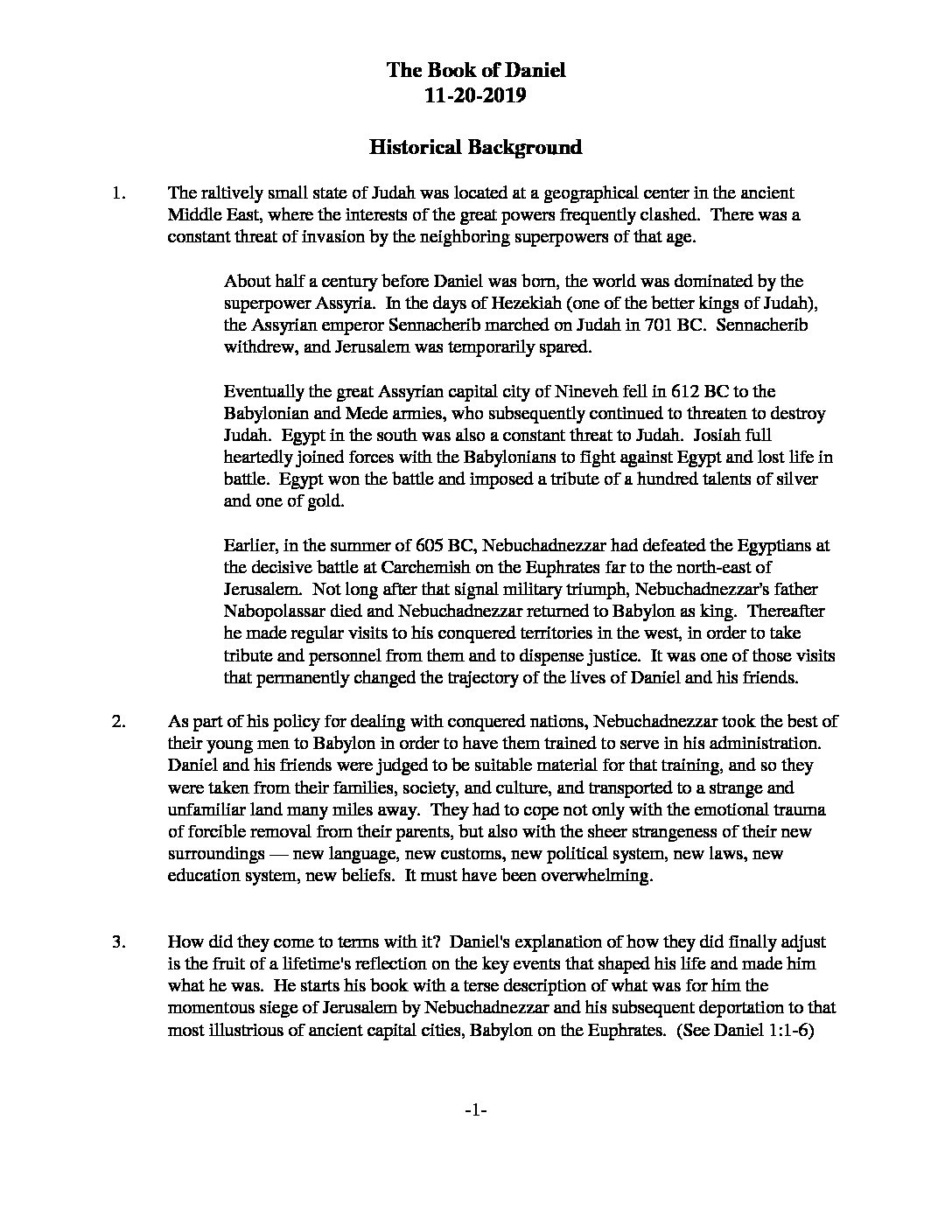The Book of Daniel #1 – Historical Background
For our study of the book of Daniel, we have study notes for each session.
Session 1, Study date: 11-20-2019
PDF Format: Daniel 11.20.2019
1. The relatively small state of Judah was located at a geographical center in the ancient Middle East, where the interests of the great powers frequently clashed. There was a constant threat of invasion by the neighboring superpowers of that age.
About half a century before Daniel was born, the world was dominated by the superpower Assyria. In the days of Hezekiah (one of the better kings of Judah),the Assyrian emperor Sennacherib marched on Judah in 701 BC. Sennacherib withdrew, and Jerusalem was temporarily spared.
Eventually the great Assyrian capital city of Nineveh fell in 612 BC to the Babylonian and Mede armies, who subsequently continued to threaten to destroy Judah. Egypt in the south was also a constant threat to Judah. Josiah full-heartedly joined forces with the Babylonians to fight against Egypt and lost life in
battle. Egypt won the battle and imposed a tribute of a hundred talents of silver and one of gold.
Earlier, in the summer of 605 BC, Nebuchadnezzar had defeated the Egyptians at the decisive battle at Carchemish on the Euphrates far to the north-east of Jerusalem. Not long after that signal military triumph, Nebuchadnezzar’s father Nabopolassar died and Nebuchadnezzar returned to Babylon as king. Thereafter he made regular visits to his conquered territories in the west, in order to take tribute and personnel from them and to dispense justice. It was one of those visits that permanently changed the trajectory of the lives of Daniel and his friends.
2. As part of his policy for dealing with conquered nations, Nebuchadnezzar took the best of their young men to Babylon in order to have them trained to serve in his administration.
Daniel and his friends were judged to be suitable material for that training, and so they were taken from their families, society, and culture, and transported to a strange and unfamiliar land many miles away. They had to cope not only with the emotional trauma of forcible removal from their parents, but also with the sheer strangeness of their new surroundings — new language, new customs, new political system, new laws, new education system, new beliefs. It must have been overwhelming.
3. How did they come to terms with it? Daniel’s explanation of how they did finally adjust is the fruit of a lifetime’s reflection on the key events that shaped his life and made him what he was. He starts his book with a terse description of what was for him the momentous siege of Jerusalem by Nebuchadnezzar and his subsequent deportation to that most illustrious of ancient capital cities, Babylon on the Euphrates. (See Daniel 1:1-6)
4. Many things that Daniel could have mentioned, which we would have liked to read about,
are tantalizingly omitted. For instance, there is nothing at all about his childhood in
Judah, and nothing of the sorry political intrigue and turmoil in the years leading up to his
deportation. Daniel chooses to start with the events of the year 605 BC, when
Nebuchadnezzar turned his military attention to Jerusalem at the edge of his empire. Its
rebelliousness chafed the emperor and so he set siege to it. Given the sheer military
power involved, the outcome was a foregone conclusion. The city was taken, the king of
Judah became a vassal, and the first wave of deportations to Babylon began. Jerusalem
city itself survived at that time, until Nebuchadnezzar eventually destroyed it in 586 BC.
The big question for someone with Daniel’s background was: why had God
allowed such a thing to happen? After all, was not his nation a special nation?
Was it not the nation of Moses, who had been given the law directly by God?
Was it not the nation that that same Moses had led out of the slave labor camps of
Egypt and brought to the land that God had promised them as an inheritance?
Was it not also the nation of David, the great consolidating king, who had made
Jerusalem his capital, and whose son Solomon had built a unique temple to the
living God? Had not God spoken to the patriarchs, priests, prophets, and kings of
that nation, with ever increasing clarity, of a coming King, the Messiah (Anointed
One), who would be a descendant of King David and preside in the future over an
unparalleled period of peace and prosperity on earth? Indeed, this messianic
vision finds an echo in the hearts of human beings from every culture, and it has
captured the minds of contemporary nations to such an extent that it is recorded
on the wall of the United Nations building in New York for the whole world to
read:
… and they shall beat their swords into ploughshares, and their spears into pruning-hooks; nation shall not lift up sword against nation, neither shall they learn war any more. (Isaiah 2:4.)
5. What would become of that vision if Jerusalem were to be sacked and the lineage of David eliminated? Would the promise of Messiah have to be relegated to the bulging dustbin of failed utopian ideas? What about God himself? Could he, so to speak, survive such a failure? How could Daniel and his friends any longer believe that there was a God who had revealed himself to their nation in a special way? If God is real, how could a pagan emperor like Nebuchadnezzar violate the sanctity of God’s unique temple and get away with it? Why did God do nothing? This is in essence the hard question that is still
very much with us today in a thousand different specific forms. Why does history so
often take a turn that shakes confidence in the existence of a God who cares?

